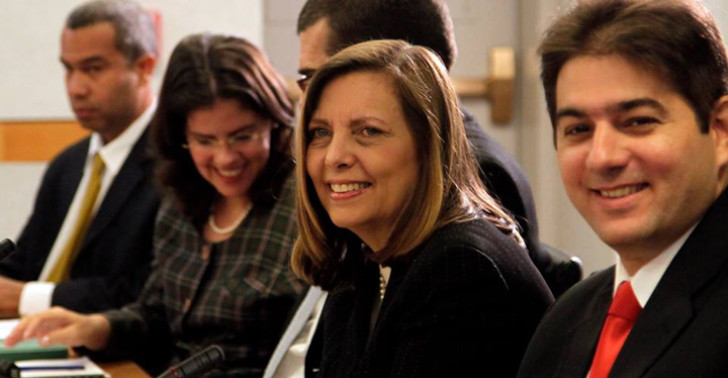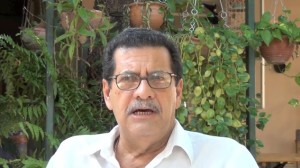
Josefina Vidal: ‘We have made progress’
That’s how Josefina Vidal, director of the U.S. Directorate of the Cuban Foreign Ministry, answered a question at the press briefing in Washington after the second round of negotiations to reestablish diplomatic relations between the United States and Cuba.
“We have not established a linkage between removing Cuba from the list of terrorist nations and the reestablishment of diplomatic relations,” Mrs. Vidal said, in answer to another question. But she also said that it will be difficult to explain an establishment of relations while Cuba remains on that list.
The issue “terrorist Cuba vis-à-vis reopening of embassies” was a question repeatedly asked because Cuba maintains diplomatic relations with countries on that list. But, to Cuba, that is an act of justice and moral vindication, Vidal said.
However, she acknowledged that that issue is subject to Washington’s own standards and those of the U.S. institutions that regulate the steps and requirements for its application.
On the topic of the extradition of a U.S. citizen sought by Washington authorities, Vidal reminded the press that Cuba and the U.S. signed an extradition treaty in 1906 but it became void in 1959, when Washington refused to extradite members of Fulgencio Batista’s dictatorship.
As to the banking problems that have beset the Cuban Interests Section in Washington for more than a year, Vidal trusts that they will be solved in a favorable manner.
Both in her words and in body language, the diplomat sent a clear message of optimism about the forward motion of the negotiations. “We are optimistic,” she said.
She also mentioned a number of topics that will continue to be broached by both delegations through contacts other than the current ones. Among them, she mentioned civil aviation, maritime zones and protection against migratory fraud.
The topic of human rights, which is of interest to both sides, will be dealt with by specialists from both countries, she said, recalling that Cuba asked to discuss this issue back in July of last year.
Through this serene diplomat, Cuba confirmed that it is possible to maintain civilized relations while respecting mutual differences.
OPINIONS
Dr. Jesús Arboleya Cervera:
Many expected an announcement of the reestablishment of diplomatic relations and the opening of embassies in Cuba and the United States, but that didn’t happen. However, both delegations appeared satisfied with the results of the talks and optimistic about their future advancement.
From my point of view, this is not a diplomatic pose. The most important aspect of the Dec. 17 announcements is that they marked the beginning of a stage where negotiations became the basic method to solve the conflicts between the two countries. That’s what we were able to witness in the just-completed round of talks.
Nor did things remain in the area of “good intentions.” Problems were identified, mechanisms were established to solve them, and steps forward were taken in other issues of mutual interest that proceed in tandem with these negotiations.
I believe that this is the most that could be expected at this moment, and that the diplomats on both sides displayed a professionalism worthy of admiration.
 Manuel Alberto Ramy, co-founder with Francisco Aruca of Progreso Weekly/Semanal:
Manuel Alberto Ramy, co-founder with Francisco Aruca of Progreso Weekly/Semanal:
- By saying that the issue of “diplomatic relations vis-à-vis list of terrorist nations” (a subject of justice for us Cubans) was not a prerequisite, Mrs. Vidal facilitated the institutional process that the U.S. authorities must follow to exclude Cuba as a terrorist nation. This can be seen as confidence that the process will be effective.
- To me, the important coincidences between Mrs. Roberta Jacobson and Mrs. Josefina Vidal were evident. They both show serene optimism. I view that as a message that now, at this moment, they are emphasizing the factor that brings the sides together and in harmony in this first step: the establishment of embassies. Theirs is a wise and practical attitude.
- Washington and Havana will remain in permanent communication.
- Mrs. Jacobson left open the possibility that the diplomatic posts will be functioning as such before the Summit of the Americas, scheduled for April in Panama City. One reading of her opinion indicates that the main obstacles will be overcome, therefore, something has been settled.
This process of rapprochement is due to several factors:
- It is obvious that the “policy of the pressure cooker,” as Aruca called it, failed to provoke a popular explosion.
- The new scenario does not allow for failed policies. The coexistence of two contradictory strategies is impossible.
- The United States’ change in policy toward Cuba is explained not only by the capacity of resistance demonstrated by Cuba and the solidarity gained worldwide, in the United Nations and elsewhere. It also responds to a redesign by Washington of world hegemony. Take a look at world events and connect the dots.
Within that view, Cuba is Latin America and Washington wants to regain all the spaces that it lost in our region. That attempt at flipping the omelet presupposes changing its policy toward our land, placing it on different rails. This is the scenario in which Cuba will have to move. Put simply, it’s quite a challenge.
Jorge de Armas, political analyst
In politics, not everything is what it seems. The optimistic statements of both Josefina Vidal and Roberta Jacobson, as well as the statement from the Cuban Foreign Ministry, reveal the transcendence of this round of talks.
The official note from the Cuban delegation says that “both delegations worked through the details about the visits and bilateral technical meetings to take place in the next few weeks on issues such as trafficking in persons, civil aviation, telecommunications, human rights, marine protected areas, prevention of migration fraud and changes in the regulations modifying the implementation of the blockade.”
The inclusion in this meeting of the embargo/blockade issue shows that both governments consider a priority the removal of obstacles that impede a normal relationship. It is odd that this issue is broached in a meeting of “a technical nature,” according to John Kerry, who specified that the discussion on the exclusion of the island from the list of sponsors of terrorism “will take place at the appropriate time.”
On this particular subject, Roberta Jacobson said that “we are going to [deal with the terrorism issue] as quickly as we can in accordance with the requirements of the law” and concluded her statement by saying that “I’m very encouraged that we will have an embassy functioning in Havana that’s able to do its work in a way that is significantly different and better than our Interests Section has been able to function up until now.”
From the cautious statements of both representatives, we deduce that the fundamental issues have been placed on the table: the embargo/blockade; the inclusion of Cuba in the [terrorism] list, and the opening of embassies before the next Summit of the Americas, set for April in Panama.


